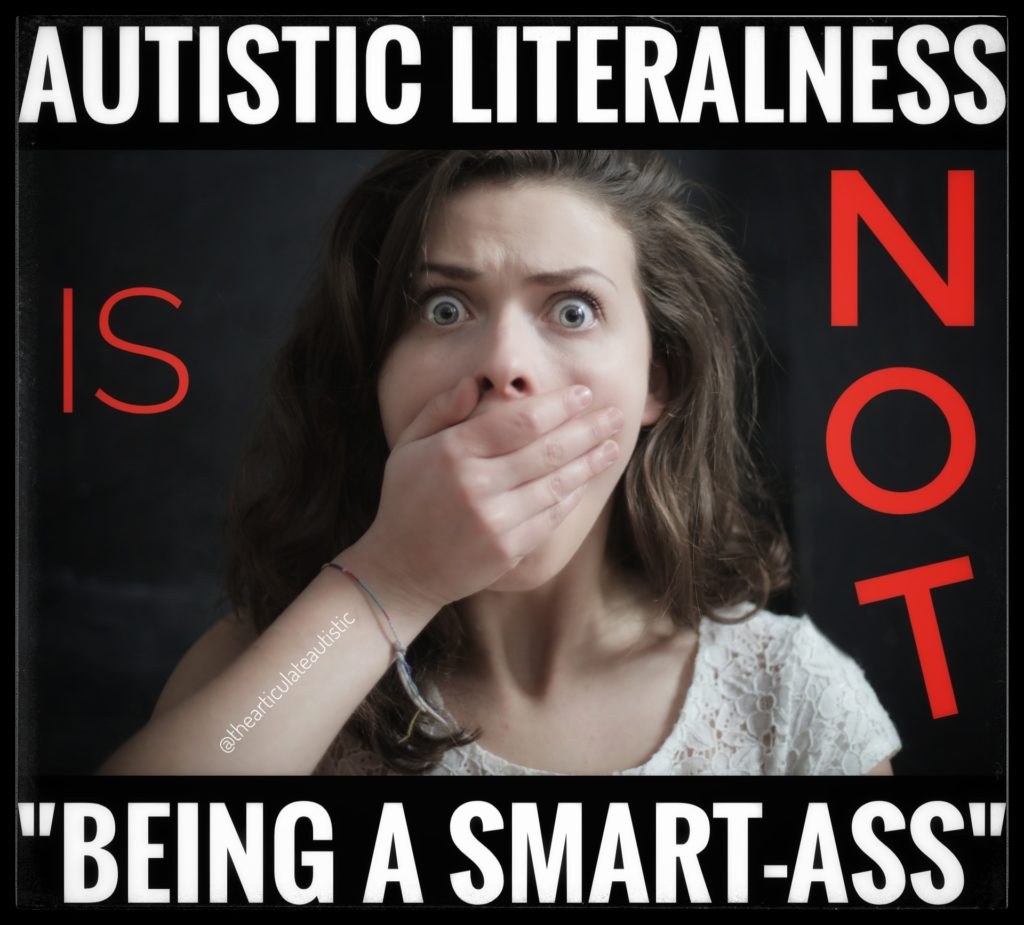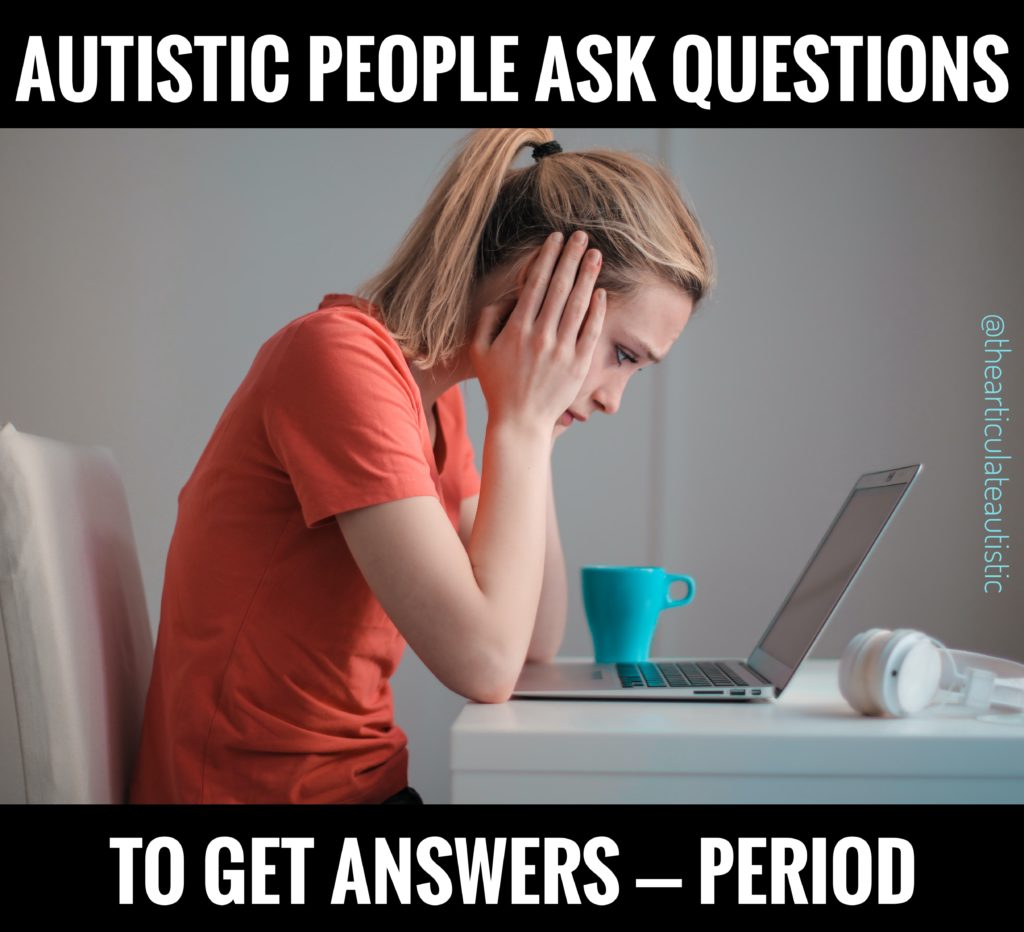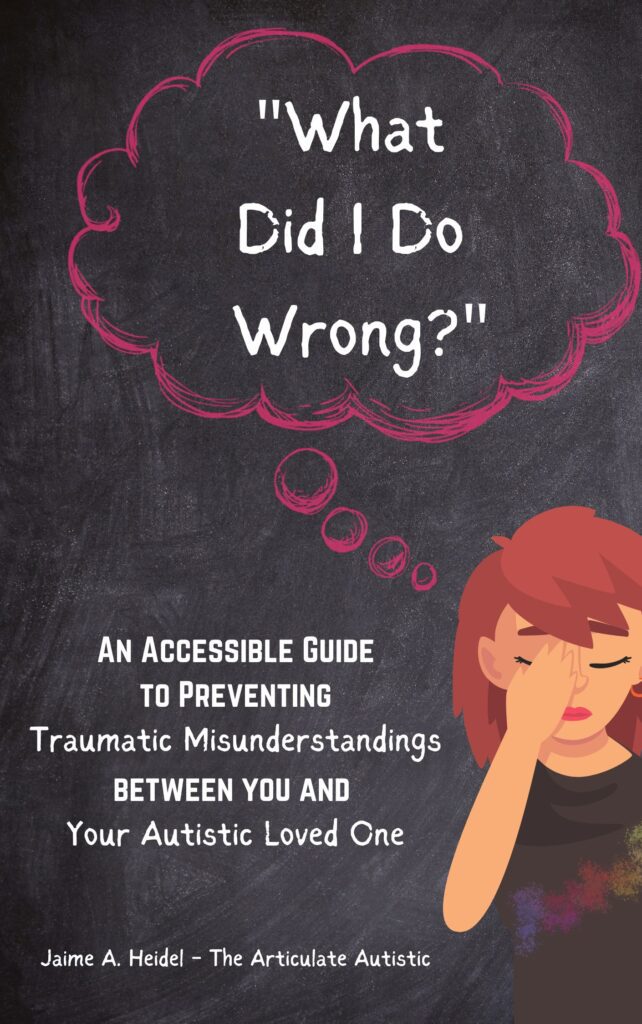Autistic Literalness Is NOT An Attempt to Be a Smart-Ass

“Don’t get smart with me.” “Very funny. You know what I meant.” “Stop being a smart-ass!”
Gah! Statements like these make me want to pull my hair out, and I don’t even have any hair right now (due to cancer treatments).
Anyway, I saw a post about a month ago on a Facebook forum for autistic people. An autistic woman had joined a weight-loss group, and the group leaders asked everyone to post a picture of what they were eating right at that moment.
Being new and having no context for the unspoken rule that the food post requested would have to be something conducive to weight loss or healthy eating, the woman posted something like a bag of Doritos, some candy, and a soda.
She posted what she was eating right then and there, exactly as requested, in an attempt to make a connection with like-minded people in the group.
The group proceeded to swarm her like killer bees, and she was told that what she posted “wasn’t funny” and that it was wrong of her to post unhealthy snacks in a group that was clearly earmarked for healthy eating and weight loss.
I’m going to go out on a limb here and say most neurotypical people probably would have caught onto that unspoken rule. However, many neurodivergent people wouldn’t. What was an innocent post and attempt to connect caused this woman to be ostracized almost immediately by a group she thought she had something in common with.
And she had no idea why! She had to come to us in the autistic Facebook group to get help having their reaction interpreted! If she hadn’t had that option, I can’t imagine how alone and confused and scared she would have continued to be.
After all, here she was just posting for the first time in a group that seemed to be friendly and encouraging towards its members, and she was instantly being told to “knock it off” when she didn’t even know what “it” was!
Imagine a lifetime of living like that.
This Kind of Thing Happens to Autistic People All the Time
Most autistic people are literal. We take what is said to us and requested of us at face value. However, if a request or a story appears to have more than one meaning, many of us will ask clarifying questions to be 100% sure we aren’t making a mistake (and also in an attempt to protect ourselves from mistreatment).
The problem with this, as I explained in a previous post, is that asking questions is also considered a no-no in neurotypical society in many different social situations depending on social hierarchy.
So, not only do we “get in trouble” (so to speak) for doing exactly what was asked of us to the letter, we also “get in trouble” for asking questions to clarify so that we don’t make a mistake.
In other words, we can’t win.
And this is incredibly traumatizing for us.
In our eyes, someone tells us what to do, we do that exact thing, the person yells at us for being a “smart-ass”, we tell them we don’t understand, they don’t believe us, we ask clarifying questions in an attempt to understand, and we are even further mistreated.
Meanwhile, the task is never done, the neurotypical person is frustrated and angry, and the autistic person is confused, traumatized, and a little less trusting of others.
Clear, Concise, and Clarified – The Key to Fewer Misunderstandings

When communicating with an autistic person, ask yourself if the words you’re using pass the “Three Cs”:
- Clear
Think about how you’re going to phrase a request or question. Are there any double meanings in your words? Could your words be taken more than one way? If so, reword your request or question in your head first so that the meaning is as clear as you can get it before speaking to the autistic person.
- Concise
It can be really easy for an autistic person to get caught up in the smaller details of a request or question, so, instead of presenting your communication in paragraph format (where there may be too much information to sift through all at once for a timely response), be concise in your wording and wait for questions.
Many autistic people digest information better if it’s presented in smaller chunks, and the ability to ask questions not only helps the autistic person control the narrative, but it also helps them formulate and ask questions that will help them clarify the exact portion of the conversation that they are unsure about.
- Clarified
Allow the autistic person to ask questions without reprisal.
I know that when I’m learning something brand new, I have to be allowed to ask questions. When I learn, I don’t get it all at once.
Instead, I’m like a detective sifting through clues. I take in the first bit but will almost undoubtedly be confused by some aspect of it, so I will ask a clarifying question. This will clear something up for me, unveiling another clue. Then, after I get that clue, I’ll have to ask another question to get the next clue, and so forth and so on.
Eventually, once I’ve unearthed all the clues with my questions, I’ll be able to put the entire picture in my mind, and then, and only then, will I be able to complete the task, answer the question, or understand the story.
If I am unable to ask questions or worse, shamed for asking them, I won’t be able to engage in the communication, and I will shut down.
The Takeaway
Autistic people do not pretend to be confused, and we’re not winding you up when we take what you say literally and do that exact literal thing you asked. Furthermore, most autistic people ask clarifying questions frequently as a part of their learning process and should never be discouraged or shamed for doing so.
Every autistic person is different, however, so it’s very important that you use this article and anything else I’ve written as a guide.
The best thing you can do to improve communication with your autistic loved one is to check in with them and let them guide you on how they learn, process, and understand the world around them. Some autistic people are sarcastic (I know I am), some love a good pun (also me), and some are completely literal all the time and don’t understand or even care to understand jokes, slang, sarcasm, etc., and that’s OK!
Learning how you both communicate can go a very long way in preventing frustrating and confusing misunderstandings. Again, we’re not being “smart-asses”. We’re just trying to understand our world and how to communicate in it without being repeatedly traumatized.
Better understand your autistic loved one, and reduce chronic misunderstandings. Pick up a copy of my book, “What Did I Do Wrong?” by clicking the link below.






Unbelievable…very well written…Autistic people do literal stuff and secondly they ask questions for clarification only.However for other person its annoying.But for us its easier to carry out a task if its clarified…Qs are important for us.